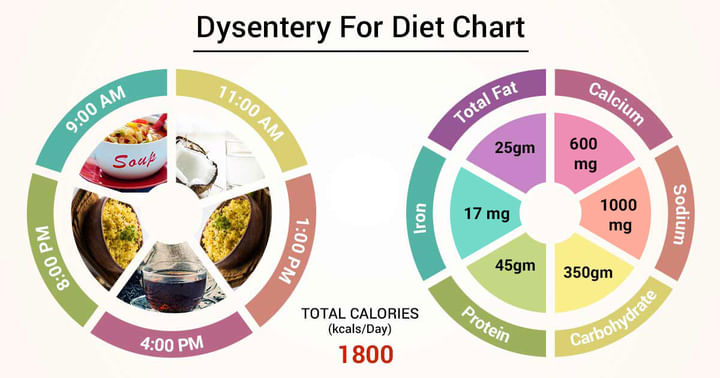Diet Chart For dysentery
Last Updated: Jan 03, 2023
About
Dysentry refers to an intestinal disorder that occurs due to amoeba or shigella bacteria. It is often accompanied by bloody diarrhoea. Contaminated food and water is the main reason for dysentery. As a result, carefully planning our nutrition is crucial. We can consult a specified dietitian to serve this purpose. To fight dysentery, we can add these things in our diet:-
- Fruits
- Nuts and seeds
- Green leafy vegetables
- Whole grains
- Yoghurt
- Dairy products with low fat, etc.
The above-stated foods help to alleviate the symptoms of dysentery. Along with these, we should also be aware of the foods that need to be excluded. These may be-
- Processed foods
- Salt-rich foods
- Carbonated beverages
- Junk foods, etc.
These foods act as barriers in the treatment process. So, we must be cautious when eating certain meals.
Summary- Following these diets will help in the progression of recovery. It will help to boost immune power to fight off the disorder.
Diet Chart
| Sunday | |
| Breakfast (8:00-8:30AM) | Vegetable soup (1 cup) |
| Mid-Meal (11:00-11:30AM) | Tender coconut water (1 cup) + 1 Apple (Unskinned) |
| Lunch (2:00-2:30PM) | Khichdi (1/2 cup) |
| Evening (4:00-4:30PM) | Boiled Black grams (1/3rd cup) + Black Tea (1 cup) |
| Dinner (8:00-8:30PM) | Khichdi (1/2 cup) |
| Monday | |
| Breakfast (8:00-8:30AM) | Boiled White Chickpeas n Tomato (1 cup) |
| Mid-Meal (11:00-11:30AM) | Tender coconut water (1 cup) + Grapes (1/2 cup) |
| Lunch (2:00-2:30PM) | Chapati (2) + Fish(1pc.) stew |
| Evening (4:00-4:30PM) | Roasted Rice Flakes (1/2 cup) + Black Tea (1 cup) |
| Dinner (8:00-8:30PM) | Boiled Rice (1/2 cup) + Baked Pumpkin (1/3rd cup) |
| Tuesday | |
| Breakfast (8:00-8:30AM) | Carrot soup (1 cup) |
| Mid-Meal (11:00-11:30AM) | Tender coconut water (1 cup) + Pomegranates (1/2 cup) |
| Lunch (2:00-2:30PM) | Boiled rice (1/2 cup) + Cabbage curry (1/3rd cup) |
| Evening (4:00-4:30PM) | Boiled Potato n Black grams (1/2 cup) + Black Tea (1 cup) |
| Dinner (8:00-8:30PM) | Boiled Rice (1/2 cup) + Mashed potato(2) + 1tsp Ghee |
| Wednesday | |
| Breakfast (8:00-8:30AM) | Vegetable soup (1 cup) |
| Mid-Meal (11:00-11:30AM) | Tender coconut water (1 cup) + 1 Guava |
| Lunch (2:00-2:30PM) | Carrot Uttappam (1) + Raita (1/3rd cup) |
| Evening (4:00-4:30PM) | Puffed Rice (1/2 cup) + Black Tea (1 cup) |
| Dinner (8:00-8:30PM) | Khichdi (1/2 cup) |
| Thursday | |
| Breakfast (8:00-8:30AM) | Baked Tomato n Brolli wity bell peper soup (1 cup) |
| Mid-Meal (11:00-11:30AM) | Tender coconut water (1 cup) + Ripe Papaya (1/3rd cup) |
| Lunch (2:00-2:30PM) | Chapati (2) + Baked vegetables (1/2 cup) + Raita (1/3rd cup) |
| Evening (4:00-4:30PM) | Boiled Black grams (1/3rd cup) + Black Tea (1 cup) |
| Dinner (8:00-8:30PM) | Boiled Rice (1/2 cup) + Bottle gourd curry (1/3rd cup) |
| Friday | |
| Breakfast (8:00-8:30AM) | Broccoli n Bell peper soup (1 cup) |
| Mid-Meal (11:00-11:30AM) | Tender coconut water (1 cup) + 1 Orange |
| Lunch (2:00-2:30PM) | Boiled Rice (1/2 cup) + Lentil soup (1/2 cup) |
| Evening (4:00-4:30PM) | Roasted Rice Flakes (1/2 cup) + Black Tea (1 cup) |
| Dinner (8:00-8:30PM) | Boiled Rice (1/2 cup) + Fish(1pc.) stew (1/3rd cup) |
| Saturday | |
| Breakfast (8:00-8:30AM) | Carrot n Beetroot soup (1 cup) |
| Mid-Meal (11:00-11:30AM) | Tender coconut water (1 cup) + 2 Chikus |
| Lunch (2:00-2:30PM) | Dosa (1) + Samber (1/2 cup) |
| Evening (4:00-4:30PM) | Boiled Potato n Black grams (1/2 cup) + Black Tea (1 cup) |
| Dinner (8:00-8:30PM) | Boiled Rice (1/2 cup) + Pointed gourd(without seeds n Unskinned) Curryurry |
Food Items To Limit
- Milk and dairy products (including milk-based protein drinks)
- Fried, fatty, greasy foods
- Spicy foods
- Processed foods, especially those with additive foods
- Pork and veal
- Sardines
- Raw vegetables
Do's And Dont's
Do's :
- Do avoid dairy products: If you have lactose intolerance, then dairy products can be a major cause of diarrhea and should be avoided in general.
- Do steer clear of too much fiber: Fiber is incredibly healthy when it comes to your everyday diet.
- Do eat a simple diet: The traditional anti-diarrhea diet was the "BRAT" diet, which stood for bananas, rice, applesauce, and toast.
- Do wash your hands regularly: When you do wash, scrub your palms, the back of your hands, between your fingers, and under your nails, and do it for at least 20 seconds
- Do stay hydrated: Above most other things, replenishing the fluids that can be lost during severe diarrhea is an important step to take.
Don'ts:
- Don't use medications without taking some precautions: The best approach for run-of-the-mill acute diarrhea is to treat the symptoms with rest, hydration, and a diet that's easy on the stomach.
- Don't treat diarrhea with herbs: Some herbs have been shown to be effective in dealing with diarrhea, but in most cases of diarrhea, going down this road would be a bit overkill.
- Don't ignore the symptoms of diarrhea if it gets severe: If you have severe diarrhea that lasts more than four weeks; bloody diarrhea; nocturnal diarrhea; or diarrhea associated with abdominal pain, nausea, vomiting, fever, or weight loss, it's a good idea to see your doctor to make sure your diarrhea isn't a sign of a more serious condition.
Food Items You Can Easily Consume
- Bananas
- White Rice
- White Bread, Pancakes, or Pasta
- Mashed Potatoes
- Steamed, Baked, or Broiled Chicken or Lean Meat
- Yogurt
- Chicken Broth
- Oatmeal, Farina, or Cream of Wheat
References
- Block LH, Tarnowski A. Banana diet in bacillary dysentery A Proctoscopic Study. The American Journal of Digestive Diseases. 1941 Jan 1;8(1):3-8. [Cited 30 June 2019]. Available from:
- Siba PM, Pethick DW, Hampson DJ. Dietary control of swine dysentery. Proceedings of the 13th !PVS Congress 1994. [Cited 30 June 2019]. Available from:
- Earnshaw PA. The raw apple diet in the treatment of dysentery. Medical Journal of Australia. 1934;2:305-10. [Cited 30 June 2019]. Available from:
Table of content
Find Dietitian/Nutritionist near me
Ask a free question
Get FREE multiple opinions from Doctors



